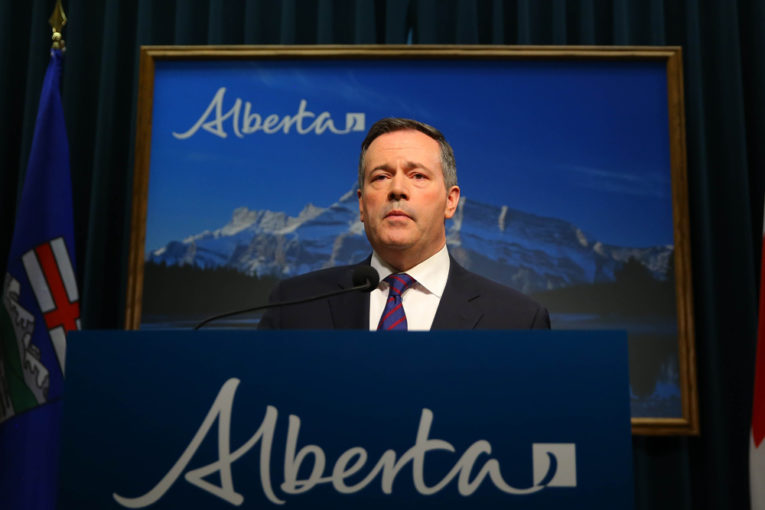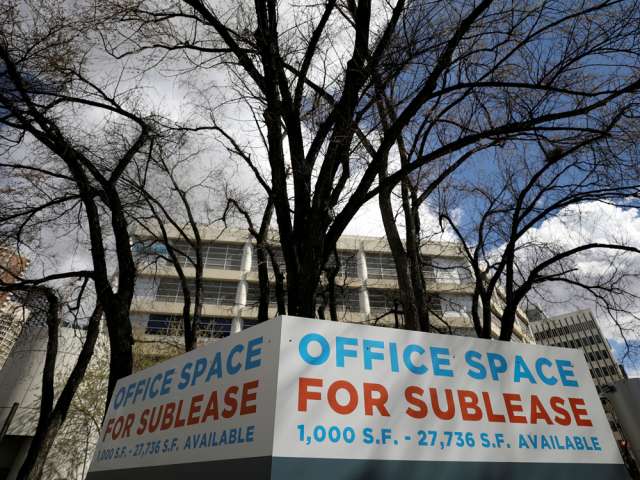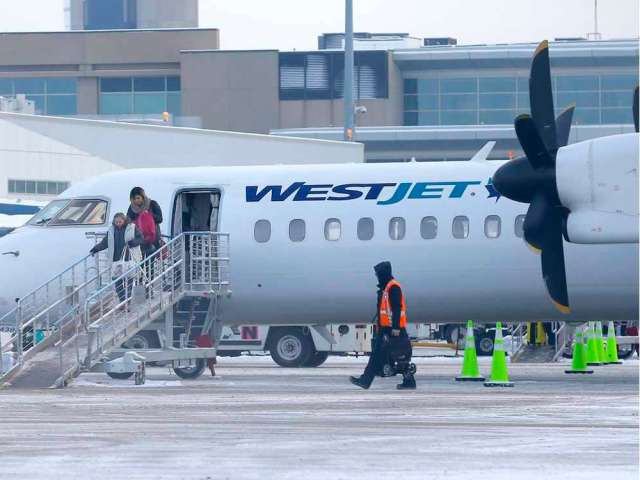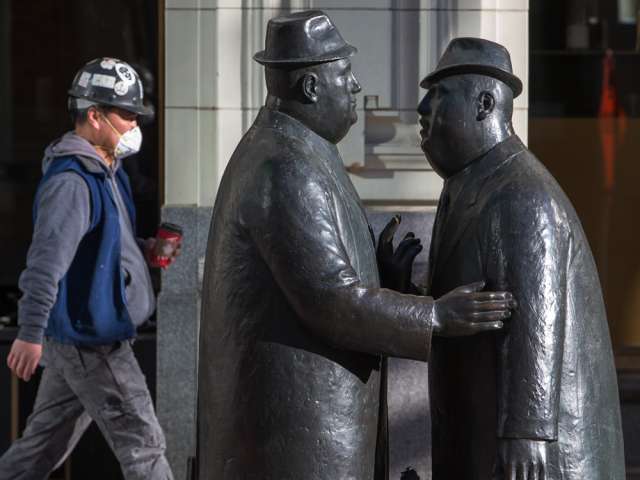
CALGARY – Alex Richardson has lost count, but he believes he’s applied for thousands of jobs in the 10 months he’s been out of work. Thousands of applications, for everything from web developer and doing inventory, to customer service and fast food, yet he’s had less than 10 interviews.
“I tailor every resumé and every cover letter to every job I apply for, because that’s what we’re told to do,” said the 37-year-old Albertan, who had been working in customer service until May 2019. He said he is willing to work anywhere and do anything.
The long stretch between jobs has Richardson struggling with anxiety, as many are in Alberta’s fragile economy, which was already suffering before the energy sector received a one-two punch from the reduction in demand for oil caused by the coronavirus and a price war between Saudi Arabia and Russia that is flooding the market with cheap crude.
Many of the province’s largest employers, including the oil and gas industry and homegrown WestJet Airlines Ltd., are being hit particularly hard by the decline in oil demand and tourism. Yet the carnage has extended across the economy: bars have been ordered to close, ski resorts and tourism operators in mountain towns such as Banff have also closed down and many construction projects have ground to a halt.
Like many thrown out of work, Richardson has tried to upgrade his skills to find work in a wider range of industries by learning to code, focusing on JavaScript technologies and a modern web application development called the MERN stack, but to no avail.
“It’s been extremely difficult, frustrating and discouraging to try to find work,” he said.
Alberta’s economy was expected to post a real GDP growth rate of 2.2 per cent this year, which would have been a modest recovery in a province that economists say has yet to fully recover from the previous recession in 2014, when oil prices crashed. Now, another brutal recession appears unavoidable as the price of Western Canadian Select crashed below the US$10-per-barrel mark on March 18.
“We are facing a period of profound adversity unlike any we have since the 1930s,” Alberta Premier Jason Kenney said Thursday as he announced a suite of financial programs including six-month mortgage, credit-card and line-of-credit payment deferrals through the provincially owned bank, ATB Financial.
We are facing a period of profound adversity unlike any we have since the 1930s
Jason Kenney
Kenney also announced $50 million in income supports for people self-isolating, but said the global downturn will hit Alberta particularly hard. A thought echoed by many others.
“Alberta is going to be hit significantly as a result of both the coronavirus and the oil-price wars we’re seeing right now,” said Adam Legge, chief executive of the Business Council of Alberta. “That has a larger-than-normal impact here in Alberta.”
Legge said he expects major oil and gas producers will be able to “weather the storm,” but he’s concerned that drilling companies, oilfield services providers and engineering companies along with the gyms, restaurants and tourism operators that are shutting their doors “are going to be at greater risk.”
More than 90 per cent of Albertans are concerned the coronavirus threat will hurt the economy and 75 per cent are concerned about their personal finances, according to an Angus Reid poll released on Tuesday. Nationwide, those numbers drop to 86 per cent and 65 per cent, respectively.
“Alberta has been in a heightened state of anxiety for so long that every possible nerve ending in the psyches of Albertans is exposed,” said Shachi Kurl, executive director of the Angus Reid Institute.
Alberta is going to be hit significantly as a result of both the coronavirus and the oil-price wars we’re seeing right now
Adam Legge
People across Canada are concerned about the coronavirus pandemic and the health crisis, but Kurl said Albertans are most likely to be “very concerned” about the impact on the economy, which has been struggling to grow for close to six years.
“In Alberta, which has been up and down, and more down than up over the past several years, it certainly feeds into a heightened sense of anxiety and a ‘what next?’ syndrome,” she said.
For job seekers, especially those who have been unemployed for a longer period of time, the recent downturn “has been a tremendous setback,” said Jackie Rafter, president at Higher Landing Inc., an HR and placement firm in Calgary that has spent the past several years helping unemployed oil and gas workers transition to other industries.

Rafter has already seen employers rescind or “pause” job offers to her clients. Other employers have gone completely silent on candidates that have already passed through multiple interview stages.
“There’s been a lot of talk amongst our clients that there may be no hiring for at least three months,” she said, noting it’s difficult for employers to do virtual job interviews and even more difficult to start a candidate in a new job when physical offices are closed.
Shannon Bowen-Smed, chief executive of staffing and recruitment firm Bowen Group, said she has also seen some job offers rescinded or paused, but at least there are few jobs left to cut at many of her company’s biggest clients.
“They were so cut to the bone already, but how much more can they do?” she said, noting that her largest clients are in energy and finance. “For every one person, they’re doing three jobs from pre-2016, so how much farther can you possibly go?”
Alberta’s unemployment rate was seven per cent at the end of 2019, compared to the national average of 5.6 per cent. This year, the provincial government said in its budget forecast that number would fall to 6.7 per cent and continue to decline to 5.1 per cent by 2023.
“This will have some unemployment impact, it just can’t be helped,” said Jack Mintz, an economist at the University of Calgary School of Public Policy.
For example, the Calgary Stampede this week announced it would lay off its part-time staff in the short term. Restaurants across the province — and much of the country — have also shut down. WestJet, which hosts one of the largest Christmas parties in Calgary each year, has said it may be forced to lay off half of its flight attendants, though it has said it is looking for staff to take voluntary leaves or work reduced hours.

Hotels in rural parts of the province that serve oilfield workers are also bracing for reduced spending in the oilpatch and, therefore, reduced occupancy.
The reduction in oil demand and the ongoing price war between Saudi Arabia and Russia pushed the price of Western Canada Select heavy oil as low as US$7.46 per barrel this week, well below the price needed for all of the province’s oilsands mines and some steam-based oilsands facilities to turn a profit.
Mintz said the oil-price shock alone is expected to take $45 billion out of the Alberta economy this year even if oil prices climb to US$30 per barrel.
“The impact is over $200 million per day,” he said. “The government could spend money on stimulus, but they’re not going to spend that much money.”
The Alberta government in its budget released in February had forecast that oil prices would average US$58 per barrel this year. The province has since acknowledged that assumption no longer holds and it’s readying a spending package in an effort to lift the economy, but it’s not ready to discuss what its fiscal picture will look like.
“There is too much fluidity in the markets right now to fully evaluate the impact,” Alberta Finance Minister Travis Toews said in an emailed statement. “We are assessing the situation as it continues to evolve and doing additional work that will help inform us as a government.”

They probably shouldn’t wait too long. Albertans already had the lowest rate of confidence in the economy before the most recent crash, according to the Conference Board of Canada’s Consumer Confidence Index. The latest index, which came out Wednesday, showed their confidence plunged 32 per cent from the previous month, compared to a 26 per cent decrease by Canadians overall.
Matt Stewart, director of economics at the Conference Board, said previous projections for a turnaround in Alberta this year after several years of “terrible growth” are now gone.
“We expect no growth in 2020 for the year as a whole,” he said. “It didn’t take much to knock us towards a recession.”
Indeed, the hits to the Alberta economy were supposed to end this year, Edmonton Chamber of Commerce chief executive Janet Riopel said. Instead, businesses in all sectors of the provincial economy, already weakened by anemic growth and a long-term decline in oil prices, could be “decimated,” she said.
“Businesses have done their very best over six years to adapt to the challenges that have been increasingly falling on them. They thought they did everything they could,” Riopel said. “This is a lot to place on them.”
Financial Post
• Email: [email protected] | Twitter: geoffreymorgan
You can read more of the news on source
